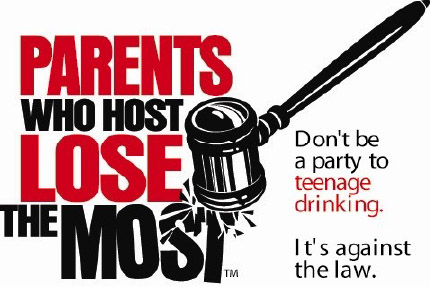Underage Drinking
Alcohol is the most commonly used and abused drug among youth in the United States.
- Excessive drinking is responsible for more than 4,300 deaths among underage youth each year
- Although the purchase of alcohol by persons under the age of 21 is illegal, people aged 12 to 20 years drink 11% of all alcohol consumed in the United States. More than 90% of this alcohol is consumed in the form of binge drinks.
- On average, underage drinkers consume more drinks per drinking occasion than adult drinkers.
Consequences of Underage Drinking
Youth who drink alcohol are more likely to experience:
- School problems, such as higher absence and poor or failing grades.
- Social problems, such as fighting and lack of participation in youth activities.
- Legal problems, such as arrest for driving or physically hurting someone while drunk.
- Physical problems, such as hangovers or illnesses.
- Unwanted, unplanned, and unprotected sexual activity.
- Disruption of normal growth and sexual development.
- Physical and sexual assault.
- Higher risk for suicide and homicide.
- Alcohol-related car crashes and other unintentional injuries, such as burns, falls, and drowning.
- Memory problems.
- Abuse of other drugs.
- Changes in brain development that may have life-long effects.
- Death from alcohol poisoning.
In general, the risk of youth experiencing these problems is greater for those who binge drink than for those who do not binge drink.
Early initiation of drinking is associated with development of an alcohol use disorder later in life.
Did You Know?
The 2017 Youth Risk Behavior Survey found that among high school students, during the past 30 days:
- Drank some amount of alcohol 30%
- Binge drank 14%
- Drove after drinking alcohol 6%
- Rode with a driver who had been drinking alcohol 17%
Effects on the Teenage Brain
Social Hosting
It is illegal to serve alcohol to minors in all 50 states, and there are no exceptions for family members. Michigan added the social host liability laws to long-standing statutes dealing with aiding or abetting alcohol consumption or possession by a minor, and laws against contributing to the delinquency of a minor, or child endangerment.
The social host liability law (MCL 436.1701) states in part that anyone who furnishes or sells alcohol to a minor is guilty of a misdemeanor and “if the subsequent consumption of the alcoholic liquor by the minor is a direct and substantial cause of the person’s death or an accidental injury that causes that person’s death,” then that host is guilty of a felony. Not only can a social host be held criminally liable, he or she may face a damages judgment in a civil lawsuit brought forth by a party injured by the negligence or recklessness of the inebriated minor, or even damages sought by the minor’s parents.
There are four fundamental elements of a social host liability claim:
- The person has suffered an injury.
- The personal injury suffered was caused by a minor (someone under the age of 21) in an alcohol-related incident.
- The host knowingly sold or furnished alcoholic liquor, or failed to make diligent inquiry as to whether the person was a minor.
- The service of the alcohol to a minor was a direct and substantial cause of the person suffering injury.
A conscientious host will not be caught in this position. There are several steps to take to prevent accidents from occurring, and regardless of possible lawsuits, every host should take reasonable precautions to make sure that no underage guest drinks alcohol. Some of these precautions are to have a bartender serve drinks, as they are trained to spot signs of intoxication.

You could be: Prosecuted, Fined $1,000, Jailed for 30 days, and held liable for monetary damages in a civil lawsuit.
Substance Abuse Council
Contact Us

34 West Jackson Street, Suite 2A
Battle Creek, MI 49017
269-326-4040
Helpful Links
© Substance Abuse Council | Designed by GreenStreet Marketing
